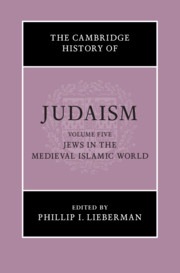Book contents
- The Cambridge History of Judaism
- The Cambridge History of Judaism
- The Cambridge History of Judaism
- Copyright page
- Contents
- Figures
- Acknowledgments
- Introduction
- Part I Jews in the Medieval Islamic World
- Part II Social and Institutional History
- Chapter 11 Demography and Migrations
- Chapter 12 Economic Activities
- Chapter 13 Jewish Religious and Communal Organization
- Chapter 14 Schools and Education
- Chapter 15 The Life Cycle and the Annual Cycle in Genizah Society
- Chapter 16 Family Life in Genizah Society
- Part III Spiritual and Intellectual History
- Index
- References
Chapter 15 - The Life Cycle and the Annual Cycle in Genizah Society
from Part II - Social and Institutional History
Published online by Cambridge University Press: 21 August 2021
- The Cambridge History of Judaism
- The Cambridge History of Judaism
- The Cambridge History of Judaism
- Copyright page
- Contents
- Figures
- Acknowledgments
- Introduction
- Part I Jews in the Medieval Islamic World
- Part II Social and Institutional History
- Chapter 11 Demography and Migrations
- Chapter 12 Economic Activities
- Chapter 13 Jewish Religious and Communal Organization
- Chapter 14 Schools and Education
- Chapter 15 The Life Cycle and the Annual Cycle in Genizah Society
- Chapter 16 Family Life in Genizah Society
- Part III Spiritual and Intellectual History
- Index
- References
Summary
The mind relies on time to make sense of the flow of experience. Human societies develop different ways of creating and marking time. Although systems for reckoning time in any given society are established by people, they are also based on the temporal sequences of nature and on the inner life of the individual. This chapter deals with two systems of time used in the society of the Jews of the medieval Islamic world whose material remains are preserved in the Genizah. It starts with the cycle of life – from an individual’s birth all the way to death. Then, it proceeds to discuss the community’s rhythms of time and the way time structured the annual cycle.
- Type
- Chapter
- Information
- The Cambridge History of Judaism , pp. 514 - 539Publisher: Cambridge University PressPrint publication year: 2021



